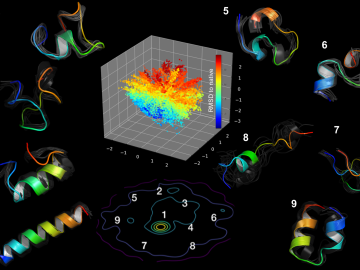Filter News
Area of Research
News Topics
- (-) Biomedical (4)
- 3-D Printing/Advanced Manufacturing (1)
- Advanced Reactors (1)
- Artificial Intelligence (20)
- Big Data (7)
- Bioenergy (4)
- Biology (4)
- Biotechnology (2)
- Chemical Sciences (1)
- Climate Change (9)
- Computer Science (34)
- Coronavirus (1)
- Critical Materials (1)
- Cybersecurity (3)
- Decarbonization (2)
- Energy Storage (2)
- Environment (7)
- Exascale Computing (14)
- Frontier (17)
- Grid (1)
- High-Performance Computing (18)
- Machine Learning (4)
- Materials (5)
- Materials Science (1)
- Microscopy (1)
- Nanotechnology (3)
- National Security (3)
- Net Zero (1)
- Neutron Science (2)
- Nuclear Energy (3)
- Physics (2)
- Quantum Computing (7)
- Quantum Science (8)
- Security (2)
- Simulation (9)
- Software (1)
- Space Exploration (2)
- Summit (15)
- Sustainable Energy (3)
- Transportation (2)
Media Contacts

Scientists at ORNL used their expertise in quantum biology, artificial intelligence and bioengineering to improve how CRISPR Cas9 genome editing tools work on organisms like microbes that can be modified to produce renewable fuels and chemicals.

Hilda Klasky, an R&D staff member in the Scalable Biomedical Modeling group at ORNL, has been selected as a senior member of the Association of Computing Machinery, or ACM.

Using artificial neural networks designed to emulate the inner workings of the human brain, deep-learning algorithms deftly peruse and analyze large quantities of data. Applying this technique to science problems can help unearth historically elusive solutions.

OAK RIDGE, Tenn., March 4, 2019—A team of researchers from the Department of Energy’s Oak Ridge National Laboratory Health Data Sciences Institute have harnessed the power of artificial intelligence to better match cancer patients with clinical trials.




